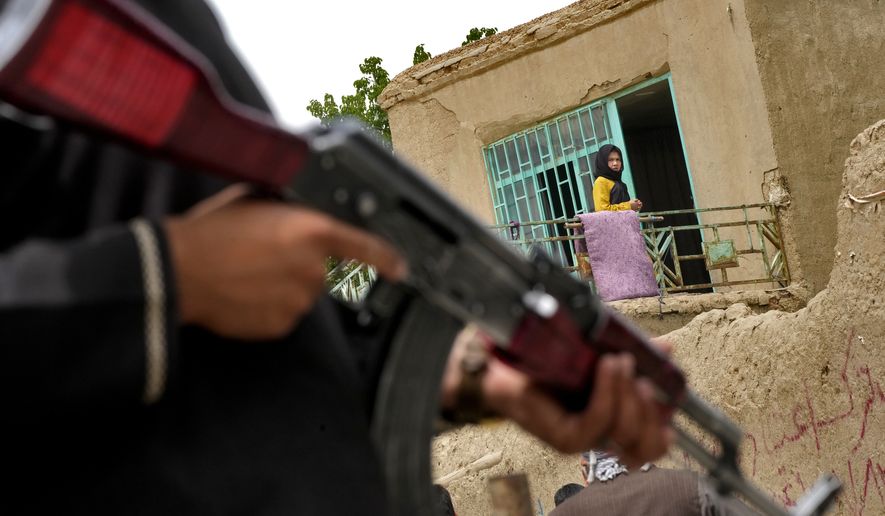The money the U.S. is sending to avert a humanitarian disaster in Afghanistan is also propping up the oppressive Taliban regime, and it has become so bad that an inspector general says federal officials need to rethink whether the U.S. support programs are worth it.
Millions of Afghans risk starvation, and mass deaths were averted last year only through a large global outpouring of humanitarian assistance, the Special Inspector General for Afghanistan Reconstruction, known as SIGAR, said in a report Thursday. Two-thirds of the country’s population is being sustained this winter by international aid.
The trade-off is that the money indirectly funds the radical Islamist Taliban regime’s widely condemned policies limiting the rights of women and girls, including a ban on schooling past the sixth grade and restrictions on movement outside their homes.
“In sum, the Taliban have effectively sentenced half the population to house arrest. Once again, women are being erased from public spaces,” said John F. Sopko, the inspector general.
The audit poses tricky questions to U.S. policymakers at a time when Afghanistan has faded from the headlines. In many ways, the situation has become more desperate than it was when President Biden ordered the final withdrawal of American troops in 2021.
“It is SIGAR’s judgment that the Taliban regime’s institutionalized abuse of women raises the important question for policymakers of whether the United States can continue providing aid to Afghanistan without benefiting or propping up the Taliban,” Mr. Sopko wrote.
The inspector general noted that Afghanistan has slumped to the bottom of world rankings on a host of dismal yardsticks in the year and a half since the messy pullout of U.S. forces ordered by Mr. Biden in the summer of 2021.
Afghanistan is the only country where women and girls are banned from attending secondary schools or universities. It has the highest rates of hunger in the world. Gallup polling conducted last summer, a year after the U.S. withdrawal, said life was worse for Afghans than “at any point in the past decade — or for anyone else on the planet.”
The Taliban’s prohibition on women working at nongovernmental organizations has struck at the nation’s ability to deliver health care. Some nonprofits have suspended operations altogether. The result is 280 facilities that have shuttered.
The international community has protested the changes, but the Taliban have “so far not faced any significant consequences,” the audit concluded.
Consolidating control
The Taliban have made major strides in consolidating the regime’s hold on the country.
The special inspector general said there are some pockets of resistance but none has succeeded in taking control of “significant territory.” Few of the troops from the Afghan National Defense and Security Forces, which the U.S. and its allies long supported with training and assistance, have joined the resistance.
Some of the security forces have gone on to fight in the Russia-Ukraine war, “on both sides,” according to the inspector general.
One area where the Taliban have failed to exert control is drug production. The United Nations reports that opium prices paid to growers have doubled, fueling a boom. Afghanistan as a whole provides 80% of the global supply.
The inspector general has been chronicling Afghanistan for most of the U.S. war and now nearly 18 months since American troops were fully withdrawn. That includes the airlift that brought tens of thousands of Afghans out of Kabul, transferred through overseas sites, then brought to military bases in the U.S. for final processing and release.
U.S. money still flows
American officials have halted the cash that was propping up the prior government in Afghanistan, which collapsed in the face of a Taliban offensive in August 2021. Plenty of assistance is still going into the country.
Mr. Sopko said some $8 billion has been made available since the August 2021 Taliban takeover, with $2 billion for humanitarian and development needs and the release of $3.5 billion in money from Afghanistan’s central bank that has been directed to redevelopment assistance. Another $2.7 billion has been allocated to the Defense Department’s airlift and housing effort for the evacuees.
The U.S. remains the single biggest donor to Afghanistan, yet the Taliban regime’s interference in international humanitarian efforts goes deep.
The State Department told the inspector general that Taliban officials have been pressuring relief workers to disclose “personal biographical details.” The Taliban also have begun charging annual fees for the use of private cars, motorcycles or bicycles, though enforcement is sporadic.
USAID, the lead U.S. foreign aid agency, recently altered its policy on cooperation with the Taliban. It was barring organizations receiving USAID money from entering into memorandums of understanding with the Taliban, reasoning that the government was not legitimate. Now, USAID-backed groups can sign memorandums but must get USAID approval first.
The Biden administration is trying to figure out how to deliver assistance it deems critical without propping up a government it deems oppressive.
State Department officials told the inspector general they have seen no indication that the Taliban are willing to consider a deal to relax restrictions on girls’ schooling in exchange for more international assistance.
• Stephen Dinan can be reached at sdinan@washingtontimes.com.




Please read our comment policy before commenting.